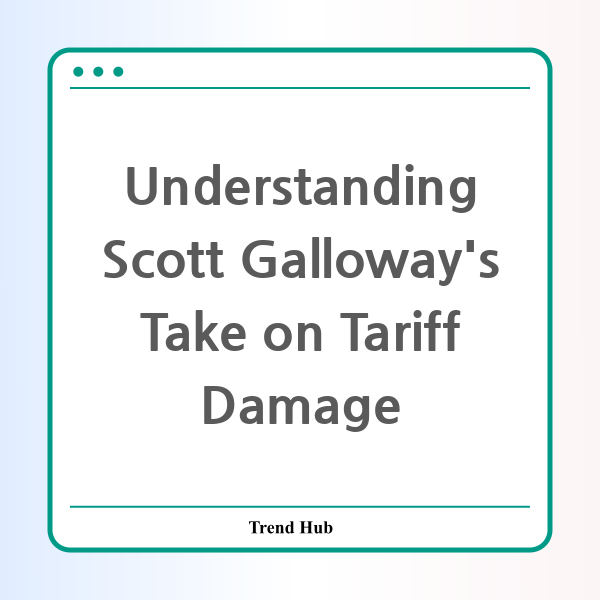* This website participates in the Amazon Affiliate Program and earns from qualifying purchases.

Have you ever wondered how economic policies impact everyday businesses and consumers? This question becomes particularly pressing when we consider the recent discourse around tariffs and their implications, particularly through the lens of prominent figures like Scott Galloway, a professor of marketing at New York University and a recognized commentator on business and technology.
In recent discussions, Galloway has characterized the outcomes of the current tariff strategies as the "definition of stupid." He argues that these tariffs have the potential to create long-lasting damage not just to businesses but to the wider economy. One of the more alarming consequences he highlights is the flow of capital out of the U.S. market and into European markets as businesses respond to this instability.
Scott Galloway's perspective sheds light on a critical issue: the impact of tariffs on corporate investment decisions. With tariffs inducing what he describes as "toxic uncertainty," companies are understandably hesitant to invest in the U.S. market. This uncertainty leads to a chilling effect on hiring, particularly for younger people entering the workforce. Galloway emphasizes that while there is considerable public support for reshoring manufacturing jobs, the reality is that many individuals are not inclined to perform these roles. Instead, there's a growing preference for jobs that are higher-paying and less labor-intensive.
Galloway's solution to what he views as an impending crisis in the job market is simple yet bold. He suggests that instead of focusing solely on bringing back manufacturing jobs that have been outsourced, policymakers should prioritize policies that increase wages to keep pace with productivity. He argues that a minimum wage adjustment to $25 per hour would significantly benefit young workers and help to stimulate broader economic growth.
As we delve deeper into this conversation, it’s essential to consider what these tariffs really mean for the average consumer. Tariffs can lead to increased prices on consumer goods, as manufacturers pass on the costs to the end-user. For instance, if tariffs were imposed on electronics, consumers could see a marked increase in prices for gadgets like smartphones and laptops. Galloway's concerns are echoed by multiple economists, pointing out that the math behind tariffs can often result in convoluted consequences that ultimately burden American households.
In summary, Scott Galloway presents a compelling argument against the backdrop of current economic policies. His focus on the broader implications of tariffs not just for the economy but for the workforce and communities is an important perspective that deserves further discussion. It raises crucial questions about the future of American manufacturing, consumer prices, and wage growth. As we navigate these complex economic waters, engaging with insights from thought leaders like Galloway can better equip us to understand and adapt to the changing landscape of work and commerce.
* This website participates in the Amazon Affiliate Program and earns from qualifying purchases.